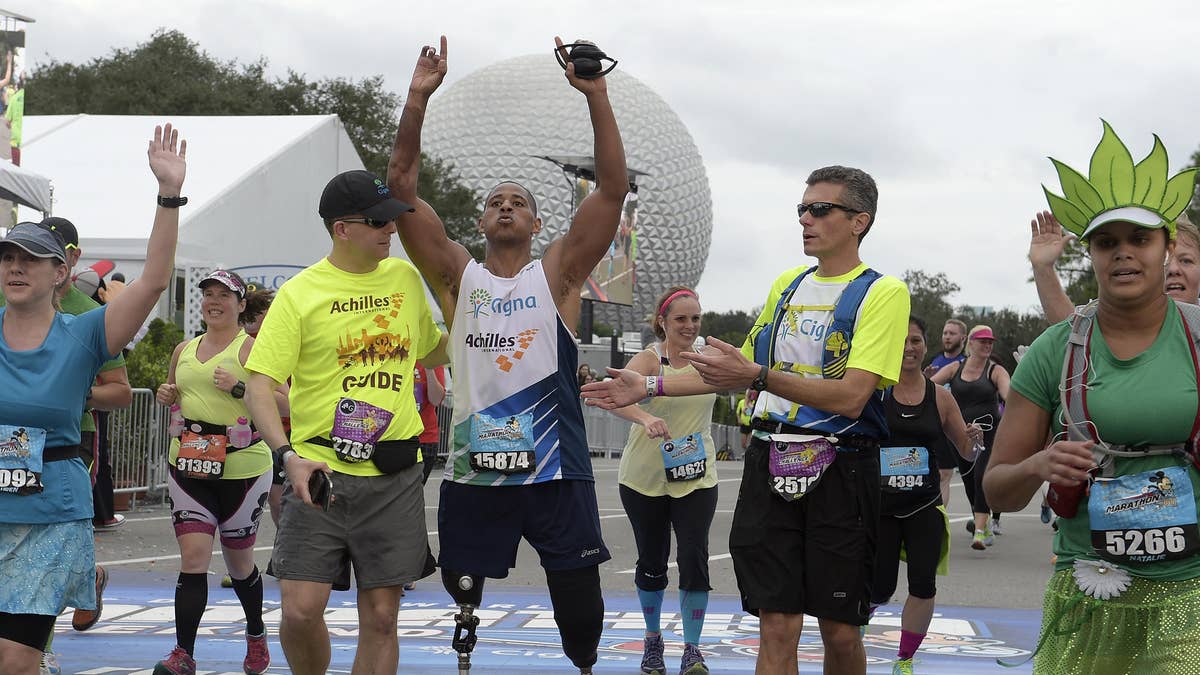
Master Sergeant Cedric King, who lost both legs during an IED explosion in 2012, completed the Walt Disney World Marathon with Cigna's CEO David Cordani (right).PHOTOGRAPH BY PHELAN M. EBENHACK
It’s the burn that Cedric King thought he lost, that sensation when you push your body to its limit on the last lap or the last rep. King calls it “redlining.”
As a master sergeant in the Army Rangers, King would redline a lot in training. His lungs would sear and his legs would pump. He was one of the fastest guys in his squad. He could run two miles in less than 12 minutes.
“I used to run so fast; I was proud of that,” he told Runner’s World. “I cannot look at myself as a follower. I want to be the absolute best, the fastest.”
On July 25, 2012, while on his second tour of Afghanistan, King lost both legs and part of his right arm and hand from an IED explosion. During rehabilitation at Walter Reed Medical Center in Washington, D.C., King felt like he’d lost part of his identity. He was afraid he’d lost the ability to push his body to its limit. To redline.
“I thought, ‘Without legs, I am not who I used to be. I am not the same person,’” King said. “I was the guy that was a competitor; when I’m at the end of that interval coming up at that quarter mile, it's that burn that I crave.”
Except, while struggling to learn how to walk on prosthetics that would rub his stumps raw, King feared he could no longer be that competitor. That is, until he met the CEO of a large healthcare corporation.
At Walt Disney World on Sunday, three and a half years after he was wounded, King completed his fourth marathon since losing his legs. He was guided by David Cordani, the CEO of the health insurance corporation Cigna, which served as the title sponsor for the race. They competed as part of the nonprofit organization Achilles International, which partners people with disabilities with guides to complete road races around the country.
“Guiding for me, at the most simple level, it revalidates the power of the human will at a very raw level,” Cordani said. He helped King finish a half marathon 17 months after the explosion. The duo has since run two Walt Disney World Marathons and a Boston Marathon together.
They make a complementary team. King is the motivator, a role he learned while inspiring fellow soldiers in Afghanistan. He’s now a motivational speaker, and you can tell just by talking to him. Ask a simple question—like, “why do you feel like you need to run another marathon?”—and he’ll provide a response that could fit on an inspirational poster.
“I like doing something that I don’t think I can do,” he said. “Like, I don’t think I could beat Floyd Mayweather, but I’d be willing to get in the ring and try.”
Cordani, with his experience as a CEO, is more analytical and detail-oriented. His job as a guide is to take care of everything for King besides the actual running. He grabs water for King, paces him, and provides a buffer so other runners won’t hit the prosthetics.
The duo doesn’t talk much during a race, but Cordani has learned how to read King’s feelings based on his stride.
“Watching Cedric’s stride I can tell when he is fatigued,” Cordani said. “The job is to try and understand him; push him in ways and pull him back in ways.”
Though they’ve raced many times before, and formed a friendship outside of running, Cordani and King say they keep finishing marathons together for different reasons.
Cordani, an Ironman finisher and 25-year endurance athlete, said he doesn’t enjoy running long distances by himself anymore. He finds guiding more rewarding.
“These guiding experiences have been by far and away the most phenomenal racing experiences I’ve had. It brings you back to the basics of why people are out on the course in the first place.”
King comes back to road racing because it fulfills part of his identity. He is able to compete once again. “It doesn’t matter what the pace is anymore; it’s the effort,” he said. King completed his latest marathon in seven and a half hours, significantly slower than what he could run before he was injured. But he doesn’t care. At about mile 17 his whole body starts to wear down, and that’s when he feels the burn that he craves.
Or, as he says, “It’s redlining. And the closer you get to redlining, the better you become.”
